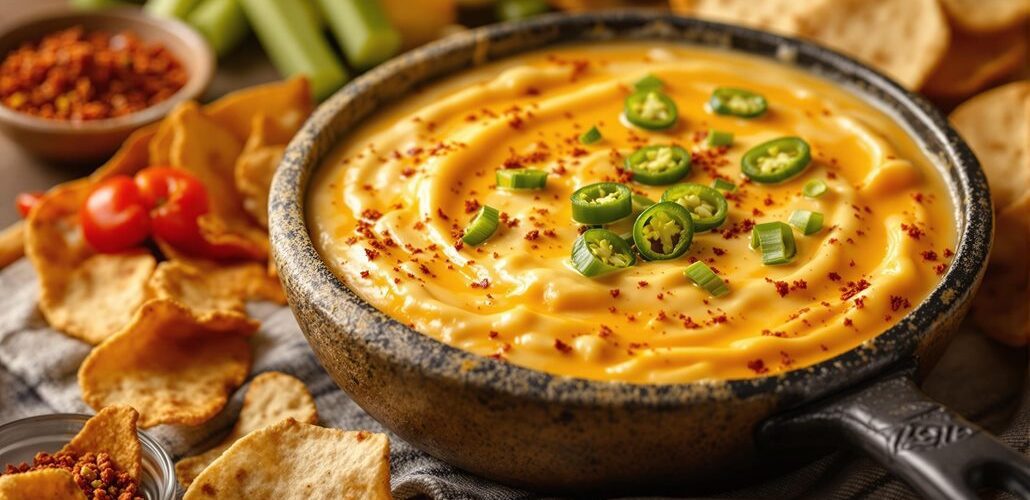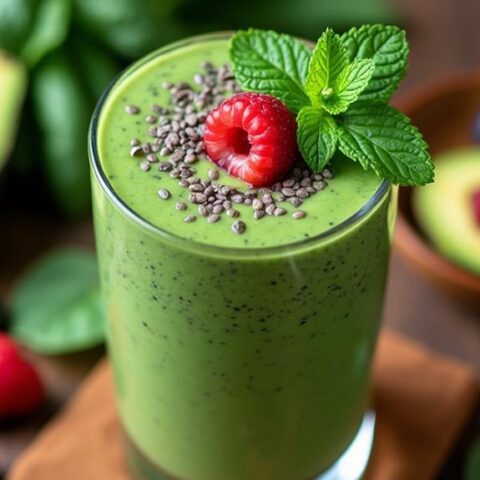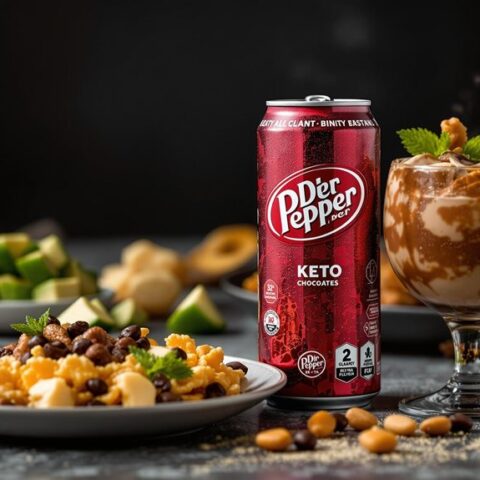
Queso gains its carbohydrate content primarily from added ingredients like tomatoes, green chilies, milk, and thickeners. While cheese itself typically has minimal carbs, these additions can raise total carbohydrate levels to about 7.3 grams per 100 grams of queso. For those monitoring carb intake, it's vital to take into account the impact of lactose from dairy and potential sugars in commercial dips. Analyzing ingredient labels and prioritizing whole, minimally processed components can help manage carb levels effectively. Understanding these factors is essential for integrating queso into low-carb or ketogenic diets without exceeding dietary limits. Explore choices for informed dietary decisions.
Key Takeaways
- Queso contains carbs primarily from added ingredients like milk, tomatoes, and starch-based thickeners.
- Commercial queso dips often include additives that increase carbohydrate content.
- Dairy sugars, especially lactose from cheese and milk, contribute to queso's carb count.
- Hidden sugars from flavor enhancers and additives in queso can raise carb levels.
- Processed cheeses in queso may have carb-laden fillers, increasing overall carbohydrate content.
Understanding Queso Ingredients
When dissecting the components of queso dip, it becomes evident that the carbohydrate content is largely influenced by its diverse ingredients. Primarily composed of cheese, queso inherently contains minimal carbohydrates. On average, cheese contributes approximately 0.9 grams of net carbs per ounce, a negligible amount considering the dip's overall nutritional profile.
However, the presence of additional ingredients such as diced tomatoes, green chilies, and spices marginally increases the carbs in queso, culminating in approximately 7.3 grams of net carbs per 100 grams. It's important to note that some commercially prepared queso dips may incorporate additives and thickeners, such as modified food starch, which can enhance the carbohydrate content. For individuals following a ketogenic diet, monitoring these additions is essential for maintaining low carb intake.
As a result, scrutinizing the ingredient list is vital for those monitoring their carb intake. The seemingly modest amount of carbs in queso is often overshadowed by its high-fat content, which accounts for about 69% of its total caloric value, aligning it with high-fat dietary preferences.
For those desiring greater control over carbohydrate content, homemade queso offers a viable solution. By adjusting ingredient choices, individuals can tailor the dip to meet specific dietary needs. Understanding the exact contribution of each ingredient is imperative for accurately evaluating the carbs in queso and making informed nutritional decisions.
Cheese as a Carb Source
Cheese typically contains minimal carbohydrates, with most varieties having between 0 to 3 grams per ounce, primarily due to the low levels of lactose.
However, queso dip, a popular cheese-based product, can contain up to 7.3 grams of net carbs per 100 grams owing to additional ingredients such as milk and starch-based thickeners.
It's important to note that some cheese products may also include hidden sugars or carb-laden fillers, which can further increase their carbohydrate content.
Understanding these variations is vital for individuals monitoring their carbohydrate intake, particularly those adhering to low-carb diets, as they must consider both the type of cheese and the specific ingredients used in processed cheese products.
Cheese Carbohydrate Content
In evaluating the carbohydrate content of cheese, it is important to recognize that most varieties, including popular options like cheddar and mozzarella, typically contain minimal carbohydrates, often less than 1 gram per ounce. This makes cheese a favorable choice for individuals adhering to low-carb or ketogenic diets.
However, it is vital to take into account recipes such as queso dip, which may have increased carbohydrate levels due to additional ingredients.
The base cheese in queso dip, whether cheddar, mozzarella, or another variety, contributes negligibly to the overall carbohydrate count. However, the inclusion of ingredients such as tomatoes, chilies, and flavor enhancers can raise the net carb content considerably.
For instance, traditional queso dip may reach approximately 7.3 grams of net carbs per 100 grams, largely dependent on specific recipe variations.
For those closely monitoring carbohydrate intake, awareness of these additional ingredients is essential. Understanding the sources of carbohydrates in queso dip allows for more informed dietary choices, ensuring that the low-carb benefits of cheese are not unintentionally offset.
This awareness is particularly beneficial for maintaining dietary goals within low-carb and ketogenic frameworks.
Carb Sources in Cheese
Analyzing the carbohydrate content in cheese requires a nuanced understanding of its role as a potential source of carbs, albeit minimal. Cheese, a core component of queso, generally contains less than 1 gram of carbohydrates per ounce. This low-carb profile stems from the natural fermentation process, where lactose is converted into lactic acid.
Yet, the presence of carbs in queso dip is primarily attributed to the additional components such as diced tomatoes, green chilies, and various starches. These added ingredients can enhance the carb content, contributing to an average of 2.7 grams of net carbs per serving (1 tablespoon).
The variability in carb content of queso can also be influenced by the specific cheese varieties used. Some cheeses, due to their unique production processes, might contain marginally higher carbohydrate levels.
For individuals adhering to low-carb or ketogenic diets, understanding the carb contributions from each ingredient in queso is significant. While cheese itself is a high-fat, low-carb food, the inclusion of vegetables and thickeners in queso necessitates careful consideration.
Consequently, when evaluating queso as part of a dietary regimen, the composite carb sources must be assessed to maintain dietary compliance.
Role of Cream in Carb Content
In examining the carbohydrate content of queso, it is essential to recognize that cream contributes minimally, typically less than 1 gram per serving, primarily adding to the fat content rather than carbs.
The presence of dairy sugars in other ingredients, such as milk and additional starches or thickeners, mainly influences the carb profile of queso.
Consequently, when cream is used judiciously in traditional recipes, it supports a low net carb approach, aligning well with low-carb dietary preferences.
Cream's Carb Contribution
Cream's contribution to the carbohydrate content of queso dip is minimal, with heavy cream containing approximately 0.4 grams of carbs per tablespoon. This indicates that the inclusion of cream in queso dip recipes contributes negligibly to the overall carbohydrate load. For those following dietary plans that emphasize low carbohydrate intake, such as ketogenic diets, cream's minimal impact on carbs makes it a favorable ingredient.
Professional medical advice often supports the use of high-fat, low-carb ingredients like cream in these dietary contexts, given their ability to sustain low carbohydrate consumption while maintaining flavor and richness in dishes.
However, the carb content of queso dip can be influenced by other ingredients. Additions such as tomatoes or thickeners, rather than cream, are more likely to raise the carbohydrate count.
Furthermore, variations in cream products, such as flavored creams or cream alternatives, may introduce unexpected carbohydrates through added sugars or starches. Consequently, it is important to scrutinize ingredient labels for any hidden carb sources.
Dairy Sugars Impact
Understanding the impact of dairy sugars, specifically lactose, is fundamental when evaluating the carbohydrate content in queso dip. Cream, a frequent ingredient in queso, contains lactose, a natural sugar contributing approximately 4.5 grams of carbohydrates per tablespoon. This informational detail underscores the importance of cream in influencing the total carbohydrate content of queso.
When cream is combined with cheese, such as Velveeta, which contains about 2.3 grams of carbohydrates per ounce primarily from lactose, the cumulative effect on the dip's carb content becomes evident.
The variation in dairy sugars, dependent on the types and quantities of cream and cheese used, presents a significant consideration for those monitoring their carbohydrate intake. Importantly, higher fat cheeses generally exhibit lower lactose levels, impacting the overall carbohydrate count.
This aspect is particularly relevant for individuals adhering to low-carb or keto diets, where precise carbohydrate tracking is essential. Consequently, understanding the role of dairy sugars is fundamental for making informed dietary choices.
Flavorings and Hidden Sugars
Steering through the world of queso dips reveals a surprising source of carbohydrates—hidden sugars and flavorings. For informational and educational purposes, it is vital to understand that these elements can greatly influence the nutritional profile of queso.
Hidden sugars may originate from additional ingredients or flavor enhancers, which are often incorporated into commercially prepared queso dips to enhance taste. These sweeteners can unexpectedly increase the total carbohydrate count, posing challenges for individuals adhering to low-carb diets.
It's important to be aware of high-carb condiments and other similar items that may contain hidden sugars. Ingredients such as diced tomatoes with green chilies, frequently used in queso recipes, contain natural sugars that further contribute to the carbohydrate content.
While flavorings like onion powder, garlic powder, and spices may individually add negligible carbs, their cumulative impact alongside other ingredients cannot be overlooked. This variability underscores the importance of scrutinizing ingredient labels for added sugars and carbohydrates, as there can be a considerable difference in carbohydrate content across various brands and recipes.
Ultimately, the inclusion of hidden sugars and flavorings in queso necessitates a thorough examination for those concerned with carbohydrate intake. By being diligent about ingredient labels and understanding the potential sources of carbs, consumers can make informed dietary choices.
Comparing Cheese Types
Exploring the nutritional landscape of cheese types reveals significant differences in their carbohydrate content, a critical factor for those following low-carb diets. Understanding the net carbs in different cheeses helps individuals make informed dietary choices. For instance, queso dip, often enriched with tomatoes and spices, contains about 2.7g of net carbs per 2-tablespoon serving, which can add up depending on portion size.
Here's a comparative analysis:
| Cheese Type | Net Carbs (per 100g) | Texture/Use |
|---|---|---|
| Colby Jack | 1.8g | Firm, versatile |
| Cottage Cheese | 3.4g | Creamy, curd-like |
| Cream Cheese | 5.5g | Soft, spreadable |
| Chihuahua Cheese | 5.6g | Semi-soft, melting |
Colby Jack is particularly lower in net carbs, with approximately 1.8g per 100g, aligning well with ketogenic principles. Cottage cheese, at 3.4g per 100g, remains manageable for low-carb enthusiasts when consumed sparingly. Cream cheese, offering a rich texture, contains 5.5g of net carbs per 100g, while Chihuahua cheese, popular in Mexican cuisine, slightly oversteps at 5.6g per 100g. Selecting cheeses with lower net carbs promotes adherence to dietary goals while allowing for diverse culinary experiences.
Carb Impact on Low-Carb Diets
For individuals adhering to low-carb diets, the carbohydrate content in queso dip, primarily derived from added ingredients like milk and thickeners, poses a significant challenge.
With a typical serving contributing approximately 2.7g of net carbs, consuming queso dip without careful portion control can quickly approach or exceed the daily net carb limits of 20g to 30g essential for maintaining ketosis.
To effectively manage carb intake, it is vital for individuals to balance the consumption of queso dip with other nutrient-dense foods throughout the day, ensuring they stay aligned with their dietary objectives.
Incorporating low-carb snacks like cheese crisps or pork rinds can also help keep carb intake in check while providing satisfying alternatives.
Carb Sources in Queso
Queso, a popular cheese-based dip, often presents a hidden challenge for individuals adhering to low-carb diets due to its carbohydrate content. The primary carb sources in queso come from ingredients such as diced tomatoes and various added starches. These components contribute considerably to the dip's net carbohydrate content, which is approximately 7.3 grams per 100-gram serving.
This figure can be particularly concerning for individuals following low-carb or ketogenic diets, where daily carbohydrate intake is typically restricted to 20-30 grams to maintain ketosis.
A standard serving size of queso dip, about two tablespoons, contains around 2.7 grams of net carbs. While this may seem minimal, it can accumulate quickly, potentially disrupting dietary goals if not monitored closely. The presence of these carb sources in queso necessitates careful consideration and planning for those seeking to adhere to a low-carb lifestyle.
Understanding the specific ingredients contributing to the carbohydrate content in queso allows for more informed dietary choices. By identifying and possibly substituting these carb-heavy components, individuals can tailor their consumption to better align with their nutritional objectives, thereby mitigating the impact on their low-carb regimen.
Low-Carb Diet Challenges
Steering through the intricacies of low-carb dieting can be particularly challenging when unexpected sources of carbohydrates, such as those found in queso, complicate meal planning.
With queso containing approximately 7.3g of net carbs per 100g, this seemingly innocuous dip can greatly impact daily carb limits. For those adhering to low-carb diets, where intake is often restricted to 20g to 30g of net carbs per day, even a modest serving of queso can pose substantial low-carb diet challenges.
One of the primary issues is maintaining ketosis, a metabolic state where the body burns fat for fuel instead of carbohydrates. The high fat content in queso might initially seem advantageous for low-carb dieters; however, the presence of carbs could disrupt ketosis, derailing dieting efforts.
A typical 2-tablespoon serving of queso contributes approximately 2.7g of net carbs, which is a notable portion of the daily carb allowance. As a result, careful consideration of the carbohydrate content in queso and similar foods is critical.
Individuals must diligently track their carb intake to guarantee they remain within their limits, thereby mitigating the challenges posed by unexpected carbohydrate sources.
Managing Carb Intake
Understanding the carbohydrate content in foods like queso is essential for individuals committed to maintaining low-carb diets. With approximately 9% of its calories derived from carbohydrates, queso dip can greatly impact daily carb limits if consumed in large quantities. A single tablespoon of queso dip contains around 2.7g of net carbs, making it imperative for low-carb dieters to manage their intake meticulously.
For those following a ketogenic diet, which typically restricts net carb intake to 20g to 30g per day, even moderate consumption of queso can quickly approach this threshold.
Effective management of carb intake involves not only monitoring portion sizes but also being strategic about accompaniments. Opting for low-carb dippers, such as vegetables, rather than traditional high-carb options like chips, can allow for the enjoyment of queso without exceeding carb limits.
Additionally, understanding the difference between total carbohydrates and net carbs—since queso contains minimal fiber—can aid in more accurate dietary planning. By considering these factors, individuals can enjoy queso's rich flavor while adhering to their low-carb dietary goals, ensuring a balanced and sustainable approach to managing carb intake.
Analyzing Net Carbs
In the domain of dietary analysis, net carbs in queso dip are an important component for those managing their carbohydrate intake, particularly on low-carb diets like keto.
It's important to note that protein needs vary based on activity level and body composition, impacting dietary choices like queso consumption. Queso dip contains approximately 2.7 grams of net carbs per serving, calculated by subtracting fiber and sugar alcohols, both of which are negligible in queso.
Here's a detailed breakdown:
- Carbohydrate Contribution: With carbohydrates making up around 9% of its total calories, queso dip is mainly a high-fat food, but its net carbs remain significant.
- Source of Carbs: The carbohydrate content mainly originates from cheese and any added ingredients such as vegetables or seasonings. Variations in recipes or brands can affect this content.
- Calculation Insight: Net carbs are derived by subtracting indigestible components like dietary fibers and sugar alcohols from total carbohydrates. In queso dip, both these elements are absent, retaining the total carbs as net carbs.
- Dietary Implications: For keto enthusiasts, understanding net carbs is vital to align queso consumption with daily carb limits. By monitoring portion sizes, queso can be integrated into a low-carb lifestyle effectively.
Conclusively, analyzing net carbs in queso dip aids in making informed dietary decisions.
Queso and Keto Compatibility
Analyzing net carbs in queso dip highlights its relevance to dietary choices, especially for individuals adhering to a ketogenic lifestyle. The professional and medical understanding of keto emphasizes maintaining ketosis, a metabolic state achieved by notably reducing carbohydrate intake, typically within the range of 20g-30g of net carbs per day. This metabolic state is essential for enhanced fat oxidation and maintaining energy levels.
With queso dip containing approximately 7.3g of net carbs per 100g serving, its inclusion in a keto diet presents challenges. Each 2-tablespoon serving of queso dip contributes roughly 2.7g of net carbs, a seemingly small amount that can accumulate rapidly, potentially hindering ketosis.
Despite its high-fat content, which aligns with the macronutrient profile of keto, the considerable carbohydrate presence necessitates careful portion control. From a medical perspective, ensuring that the carbohydrate intake remains within the ketogenic threshold is essential for sustaining the desired metabolic state.
Therefore, individuals on a ketogenic diet must approach queso consumption with caution, considering both the carb content and portion size to avoid surpassing their daily carb allowance. While queso dip may be free from sugars and refined oils, its carbohydrate content remains a vital factor in evaluating its keto compatibility.
Tips for Lower-Carb Queso
Creating a lower-carb queso dip is achievable with thoughtful ingredient choices and preparation techniques. By selecting the right components, you can enjoy a flavorful queso while minimizing carbohydrate intake. Consider the following evidence-based tips:
1. Use cream cheese as a base: With approximately 5.5g of net carbs per 100g, cream cheese offers a keto-friendly option that maintains the creamy texture queso is known for.
Additionally, incorporating full-fat dairy such as heavy cream can enhance the richness of your dip without adding considerable carbs.
2. Incorporate low-carb cheeses: Shredded varieties like Colby Jack or Chihuahua cheese contain 1.8g and 5.6g of net carbs per 100g, respectively, and can help reduce the overall carb content of your dip.
3. Add vegetables mindfully: Fresh diced vegetables such as bell peppers or green chilies enhance flavor while keeping carbs low. For instance, 1/4 cup of diced green chilies contains only about 2g of net carbs.
4. Opt for unsweetened alternatives to dairy milk: Substituting traditional milk with unsweetened almond or coconut milk can considerably lower carb intake, as these alternatives often contain just 0.3g of carbs per cup.
These guidelines serve as a substitute for professional medical advice, focusing on ingredient choices that align with a lower-carb lifestyle.
Prioritizing whole, minimally processed ingredients will further support your dietary goals.
Alternative Cheese Choices
For those embracing a low-carb lifestyle, exploring alternative cheese choices can greatly impact dietary success. Selecting the right cheese can greatly reduce carbohydrate intake while maintaining flavor and nutritional value.
Colby Jack cheese, containing approximately 1.8g of net carbs per 100g, is a prime example of a keto-friendly option. Its low carbohydrate content and rich taste make it a versatile choice for various dishes.
Additionally, cheese like full-fat cheese options such as cheddar offer a low-carb solution with added nutritional benefits. Alternatively, cottage cheese offers around 3.4g of net carbs per 100g, suitable for ketogenic diets when consumed in moderation. Its higher carbohydrate content necessitates careful portion control to align with low-carb goals.
Cream cheese, with about 5.5g of net carbs per 100g, provides a moderate carb option. Its high-fat content complements low-carb plans, enhancing satiety while adding a creamy texture to meals.
Chihuahua cheese, featuring approximately 5.6g of net carbs per 100g, is another alternative cheese choice. It requires mindful consumption but can fit into a keto diet.
When selecting cheeses, understanding their varying carbohydrate contents is essential for maintaining a low-carb regimen. By incorporating these alternative cheese choices, individuals can enjoy diverse flavors without compromising their dietary objectives.
Frequently Asked Questions
Does Queso Have a Lot of Carbs?
Queso contains moderate carbohydrates, primarily from its ingredients like cheese and added vegetables. With approximately 7.3 grams of carbs per 100 grams, it's relatively low-carb but not suitable for strict low-carb diets, such as keto.
Does Mexican Queso Dip Have Carbs?
Mexican queso dip contains carbohydrates due to ingredients like Velveeta cheese and tomatoes with green chilies. The nutritional breakdown shows approximately 2.7 grams of net carbs per tablespoon, necessitating careful portion control for low-carb dietary adherence.
Is Queso Ok on Keto?
Queso can be included in a keto diet if consumed in moderation, given its 2.7g of net carbs per serving. Opt for keto alternatives like low-carb vegetables as dippers to maintain ketosis while enjoying queso.
Does Chips and Queso Have Carbs?
Chips and queso exhibit significant carb content, primarily due to tortilla chips, which contain 15-20g of carbs per ounce. Coupled with queso's 2.7g per tablespoon, this snack typically exceeds 20g of carbs, challenging low-carb dietary goals.
Conclusion
The carbohydrate content in queso is primarily influenced by its ingredients, including cheese, cream, and various flavorings. Different cheese types contribute varying carb levels, while cream can add additional carbohydrates. Flavorings and hidden sugars further affect the overall carb content. When evaluating net carbs, understanding these components aids in determining queso's compatibility with low-carb diets like keto. Employing alternative cheese choices and mindful ingredient selection can result in a lower-carb version suitable for those monitoring carb intake.










No Comments